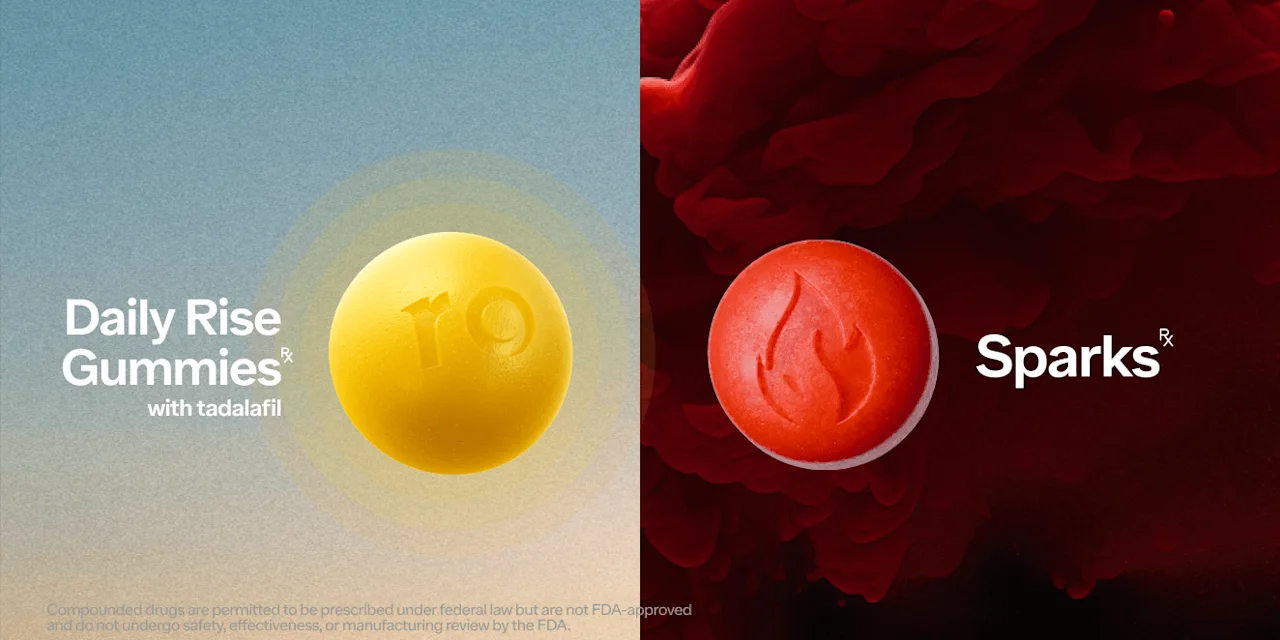Here's what we'll cover
Here's what we'll cover
Cialis is a medication known as a PDE5 inhibitor, which is a class of medications that includes drugs like Viagra (sildenafil), Levitra (vardenafil), and others. These drugs are commonly used to treat erectile dysfunction (ED), which is when a person has difficulty getting or maintaining an erection long enough for satisfying sex.
While most ED medications have to be taken during a certain window before you plan to have sex, Cialis is unique in that it can be prescribed for daily use and lasts for longer, removing the planning element.
Also, Cialis has been shown to help alleviate symptoms of benign prostatic hyperplasia (BPH), a common condition in men as they get older that can cause urinary symptoms like difficulty peeing. That makes it a great treatment option for people who have both BPH and ED.
Cialis Important Safety Information: Read more about serious warnings and safety info.
Viagra Important Safety Information: Read more about serious warnings and safety info.
What is Cialis?
Cialis is one brand name of the drug tadalafil. Tadalafil is also sold under the brand names Adcirca and Alyq, which are medications used to treat a lung condition called pulmonary arterial hypertension (PAH).
Cialis is a longer-acting type of PDE-5 inhibitor, which is a class of medications that are used to treat erectile dysfunction.
What is Cialis used for?
Cialis is FDA-approved for the treatment of (FDA, 2011):
Erectile dysfunction: Erections depend on more than just arousal—you need cooperation between your brain, hormones, blood vessels, and nerves. If any step isn’t in sync, you may have trouble getting an erection.
Benign prostatic hyperplasia (BPH): BPH is a common condition in which the prostate grows and puts pressure on the urethra, which is the tube that carries urine from the bladder out through the penis. Often, the prostate gets so large that it makes it difficult to pee.
Cialis is FDA approved for treating both of these conditions individually and together, making it a convenient treatment option for people who have both ED and BPH.
Tadalafil, the active ingredient in Cialis, is also FDA approved for treating pulmonary arterial hypertension, which is high blood pressure in the lungs.
Additionally, healthcare providers sometimes prescribe tadalafil off-label to treat other conditions. That means that while the FDA hasn’t explicitly approved the drug for this purpose, a licensed healthcare provider can still prescribe it based on their clinical judgment and evidence in the research.
Tadalafil is commonly used off-label to treat a condition called Raynaud’s phenomenon, which is characterized by poor blood flow in areas like the fingers and toes. While the most common treatment for this condition is prevention (by keeping your hands warm or reducing stress), tadalafil may also help.
How does Cialis work?
Getting an erection depends on communication between your brain, the blood vessels in your penis, and your blood flow. When you get aroused, the blood vessels in the penis open wider to allow blood to flow in and make your penis hard. For people with ED, that blood flow isn’t strong enough, or their blood vessels don’t stay open long enough to get the blood into their penis.
Cialis works by maintaining blood flow into the penis, giving you stronger and longer-lasting erections. However, Cialis and other PDE5 inhibitors won’t give you an automatic erection. You need to be aroused for them to work.
Many people with BPH experience difficulty urinating, and Cialis has been shown to alleviate urinary symptoms, making it a good choice for people with both BPH and erectile dysfunction (Oelke, 2012).
Risks and side effects of Cialis
Most people who use Cialis don’t experience side effects, but when they do, side effects are generally mild. These can include (FDA, 2011):
Flushing and sweating
Headaches
Nausea, indigestion, or diarrhea
Runny nose or congestion
Muscle aches
Back pain
Serious side effects of Cialis are uncommon and include:
Low blood pressure (hypotension): Cialis makes your blood vessels widen (kind of like adding more lanes to a highway and relieving the traffic), resulting in lower blood pressure. This is more common if you have underlying heart disease, if you drink more than five alcoholic drinks a day, or if you’re taking a medication called an alpha-blocker (FDA, 2011). Symptoms of low blood pressure include dizziness and loss of consciousness.
Priapism: Priapism is a painful, prolonged erection lasting four hours or more. While rare, priapism is a medical emergency and a reason to seek immediate medical attention (Rezaee, 2020).
Vision changes: Cialis may cause blurred vision, problems with color vision, and vision loss. There are also a few reports of a condition called non-arteritic anterior ischemic optic neuropathy (NAION) in people who took Cialis. NAION may lead to permanent vision loss in one or both eyes (Pomeranz, 2017). If you experience visual changes while using Cialis, contact your healthcare provider.
Hearing loss: There are rare reports of sudden hearing loss within a few days of starting Cialis, usually in one ear (Wester, 2018; Maddox, 2009).
Bleeding: Cialis may affect blood cells called platelets which make your blood clot. This may lead to bleeding (FDA, 2011). Be sure to tell your healthcare provider about all medications you are taking and your full medical history before starting treatment.
Cialis dosages
Cialis is only available by prescription and can’t be found over the counter. You can get Cialis and the generic of Cialis from a pharmacy or a physician who can prescribe Cialis online.
It is available in 2.5 mg, 5 mg, 10 mg, and 20 mg tablets.
The starting dose of Cialis depends on what it’s prescribed for and how it’s prescribed (FDA, 2011):
For erectile dysfunction: Cialis dosages usually start at 10 mg taken 30-60 minutes before sexual activity. Alternately, you can take a lower dose of 2.5 mg once a day.
For BPH: Cialis dosages usually start at 5 mg, taken once a day.
Your healthcare provider may increase the dosage based on symptoms, side effects, and any other medications you’re taking. You can take Cialis with or without food.
How long does Cialis last?
Cialis is one of the longest-lasting erectile dysfunction medications available. Depending on your dosage, the medication is typically effective for up to 36 hours, while other PDE5 inhibitors, like Viagra (sildenafil) and Levitra (vardenafil), are effective for a shorter period (FDA, 2011).
Because you can take Cialis daily, many people find it to be a convenient option for treating ED. It doesn’t require planning your dosage around when you plan to have sex, giving you more spontaneity.
Cialis warnings and drug interactions
Cialis can cause adverse reactions if you combine it with other medications. Before starting treatment, be sure to discuss any medications or supplements you are taking with your healthcare provider. Some examples of drugs to avoid when you’re taking Cialis include (FDA, 2011):
Certain heart medications: Cialis may be dangerous if you take it at the same time as nitrates (including nitroglycerin), certain blood pressure medications, and alpha-blockers. Combining these medications with Cialis can cause a dangerous and possibly fatal drop in blood pressure.
Alcohol: While having a drink or two probably isn’t a problem, drinking a lot of alcohol while taking Cialis can cause dizziness or even loss of consciousness because they both reduce blood pressure.
HIV medications: Certain antiretroviral medications called protease inhibitors (like ritonavir) that are used to treat HIV may slow your liver’s ability to clear Cialis from your body. This raises the level of the medication in your system and may require a dosage adjustment.
Antifungals: Medications like ketoconazole and itraconazole treat fungal infections, but they may also interfere with your liver’s ability to get rid of Cialis.
Rifampin: Rifampin is an antibiotic that treats infections like tuberculosis. Taking it with Cialis may reduce the amount of Cialis in your body, making your dosage less effective.
Do not adjust medication dosages on your own. Speak with a healthcare provider about changing your dosage regimen if necessary.
Who should avoid Cialis?
Cialis isn’t for everyone, and it’s more likely to cause adverse effects if you have certain underlying health conditions or risk factors. Before starting treatment with Cialis, let your healthcare provider know if you (FDA, 2011):
Are allergic to Cialis
Have a history of heart problems, including irregular heartbeats, chest pain/angina, low blood pressure, or heart failure
Have had a heart attack or a stroke
Have a history of leukemia, sickle cell anemia, or Peyronie’s disease—which can all increase the risk of priapism—or if you have had priapism in the past.
Have a history of stomach ulcers
Take nitrates, nitrites, alpha-blockers, or other blood pressure medications.
Have an eye condition called retinitis pigmentosa
Have kidney or liver disease
If you have ED, BPH, or both, Cialis might be a great option. Your healthcare provider can help you decide if Cialis is the best medication for you.
DISCLAIMER
If you have any medical questions or concerns, please talk to your healthcare provider. The articles on Health Guide are underpinned by peer-reviewed research and information drawn from medical societies and governmental agencies. However, they are not a substitute for professional medical advice, diagnosis, or treatment.
Maddox, P. T., Saunders, J., & Chandrasekhar, S. S. (2009). Sudden hearing loss from PDE-5 inhibitors: A possible cellular stress etiology. The Laryngoscope, 119 (8), 1586–1589. doi: 10.1002/lary.20511. Retrieved from https://pubmed.ncbi.nlm.nih.gov/19507217/
Oelke, M., Giuliano, F., Mirone, V., Xu, L., Cox, D., & Viktrup, L. (2012). Monotherapy with tadalafil or tamsulosin similarly improved lower urinary tract symptoms suggestive of benign prostatic hyperplasia in an international, randomised, parallel, placebo-controlled clinical trial. European Urology , 61 (5), 917–925. doi: 10.1016/j.eururo.2012.01.013. Retrieved from https://pubmed.ncbi.nlm.nih.gov/22297243/
Pomeranz, H. D. (2017). Erectile Dysfunction Agents and Nonarteritic Anterior Ischemic Optic Neuropathy. Neurologic Clinics, 35 (1), 17–27. doi: 10.1016/j.ncl.2016.08.007. Retrieved from https://pubmed.ncbi.nlm.nih.gov/27886893/
Rezaee, M. E. & Gross, M. S. (2020). Are We Overstating the Risk of Priapism With Oral Phosphodiesterase Type 5 Inhibitors?. The Journal of Sexual Medicine , 17 (8), 1579–1582. doi: 10.1016/j.jsxm.2020.05.019. Retrieved from https://pubmed.ncbi.nlm.nih.gov/32622767/
United States Food and Drug Administration (FDA). (2011). Highlights of Prescribing Information: Cialis. Retrieved on Feb. 2, 2022 from https://www.accessdata.fda.gov/drugsatfda_docs/label/2011/021368s20s21lbl.pdf
Wester, J. L., Ishiyama, G., Karnezis, S., & Ishiyama, A. (2018). Sudden hearing loss after cialis (tadalafil) use: A unique case of cochlear hydrops. The Laryngoscope, 128 (11), 2615–2618. doi: 10.1002/lary.27428. Retrieved from https://pubmed.ncbi.nlm.nih.gov/30208203/










